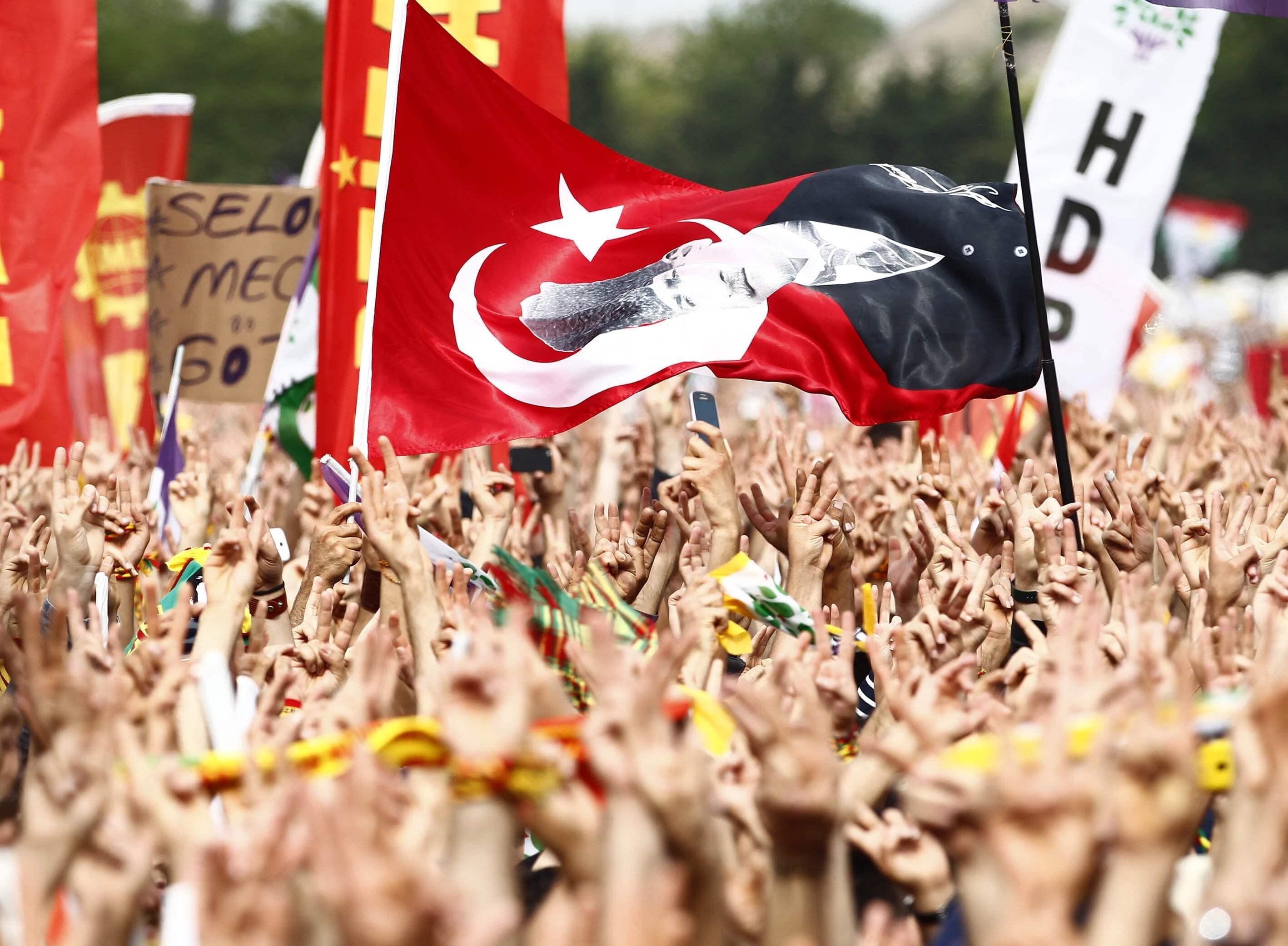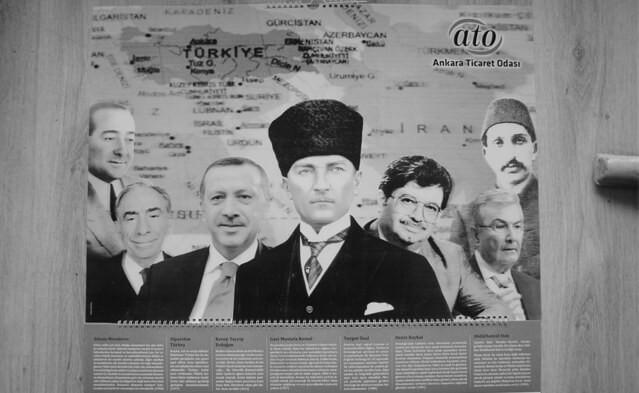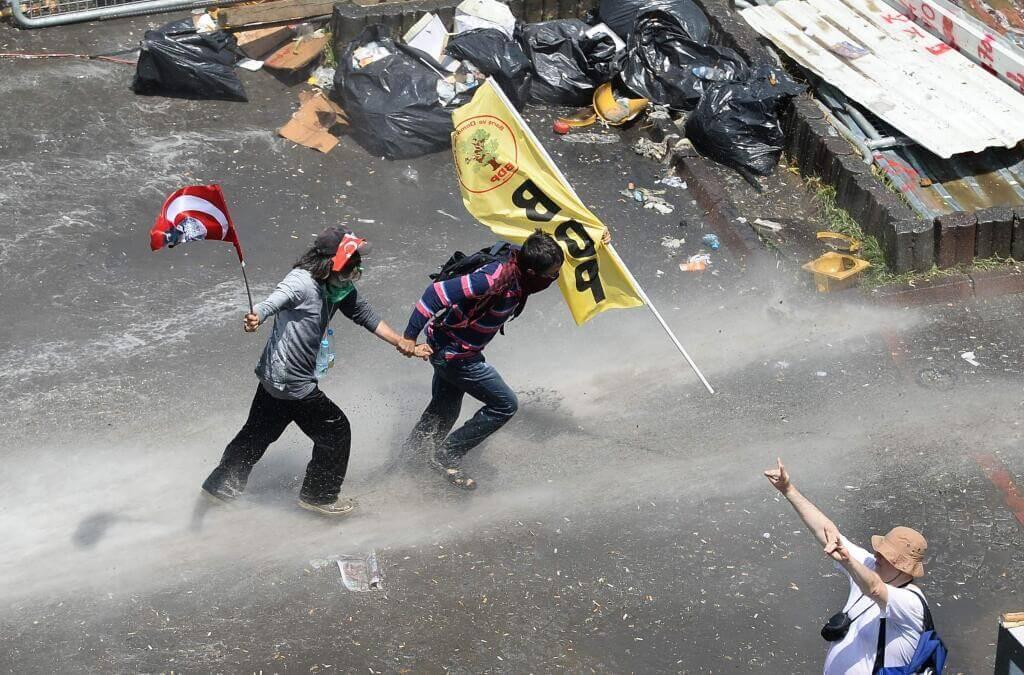Turkey’s ultimate success and Gezi democratization

To understand the transformation of Turkish politics, no day in the recent past could be as useful as May 30, which was full of remarkable meanings and symbols.
During the May 30 rallies, Turkish President Recep Tayyip Erdoğan, accompanied by Prime Minister Ahmet Davutoğlu and surrounded by a ceremonial Ottoman brigade,
accused national and international media, defended an Ottoman sultan who tried to suppress the first seeds of democracy in Turkey and claimed that he was being targeted by an evil global alliance.
Opposition parties, on the other hand,
opted to stick to reality. Republican People’s Party (CHP) focused on economy, while the Nationalist Movement Party (MHP) criticized the government for what it saw as an illegal military intervention in Syria.
Most remarkably, the Kurdish problem-focused Peoples’ Democratic Party (HDP), whose performance against the 10 percent electoral threshold may play a key role to curb the AKP’s power, organized a massive rally in Istanbul in which Turkish flags and Mustafa Kemal Atatürk portraits were prominently displayed in never-before-seen scenes.
Photo: Anadolu Agency
Those who are concerned about Turkish democracy surely have a reason. Just check the latest news:
President
Erdoğan actively campaigned for the ruling Justice and Development Party (AKP) with a
discourse oversaturated with religion and polarizing phrases, breaking his
constitutional oath of impartiality under the
approving gaze of the top state body, which is supposed to guarantee fair elections.
Besides opposition parties, Erdoğan repeatedly targeted national and international media, using a divisive language, while his chief advisor “
readied his pistols.”
PM Davutoğlu, on the other hand, jointly participated in several events with the president during his campaign, and also
tried to put pressure on media and business leaders, who were
previously “assured” by Erdoğan that Ankara would not do what Russian President Vladimir Putin did to Russian businessmen.
Meanwhile, opposition parties’
buildings and
candidates were physically attacked throughout their campaigns, their
events were disrupted by security forces, court rulings that angered Erdoğan
were ignored and the government did
a number of
things to reinforce suspicions that it has been preparing to wage war with Syria.
Even
Turkey’s economy tsar warned of a deteriorating rule of law, as surveys found out that
free speech and human rights, as well as
public trust in fair elections, have declined.
These are all serious and negative indicators and some of them may confirm predictions that
Turkey’s risks are likely to increase after the June 7 election. However, I would argue that Turkey’s democracy will be better than today in the long-run, given the big picture now laid in front of us and the country's political history.
The 2013 calendar of the Ankara Chamber of Commerce, focusing on Turkey's Middle East policy, had created controversy by featuring photos of Mustafa Kemal Atatürk, former president Turgut Özal, former prime minister Adnan Menderes, MHP's founder Alparslan Türkeş, former CHP chair Deniz Baykal, then Prime Minister Erdoğan and Ottoman Sultan Abdulhamid II together.
The ultimate success of the Republic stems from the fact that it crafted a political model in which all parties get rid of their excesses sooner or later in order to adapt to changing popular demands. Those who are not able to evolve are eliminated through natural selection in the ballot box where the fittest survive.
When post-Atatürk CHP failed to respond to public demands in the 1940s, Turkish people picked the center-right Democrat Party (DP). The center-left CHP could only return to lead the government in 1974 when Bülent Ecevit curbed its regressive elements and transformed it to respond to popular demands.
That which did not kill democracy in Turkey made it stronger, including military coups and street violence in the 1970s. Yes, they interrupted the natural democratic progress of the Republic, but none of them managed to undo it completely. In fact, they boosted the democratic forces that would soon remove them.
The Motherland (ANAVATAN) Party dominated Turkish politics in the 1980s, but people punished it in the 1991 general elections when it was perceived to be corrupted by power. Similarly, the AKP’s long rule was the result of the previous government’s unprecedented economic and political failures in the late 1990s.
Whoever carefully looks into today's opposition parties’ electoral pledges and campaigns sees how responsive they are. The response is not only to the worsening economy, but also the massive
Gezi Park protests in 2013, which demanded better democracy, pluralism and de-centralism.
A Gezi Park protester carrying the flag of the Kurdish problem-focused HDP's predecessor BDP is seen here while helping a female demonstrator with a Turkish flag bearing an Atatürk photo during an ongoing police crackdown, as another protester challenges security forces with a Turkish nationalist hand gesture in Taksim, Istanbul, on June 11, 2013.
In spite of all of its flaws, the Republic has recorded a unique success in the region.
It took a Kurdish nationalist-separatist movement and ultimately turned it into a modern center-left party that advocates pluralism, embracing the whole country. What Selahattin Demirtaş and Figen Yüksekdağ are doing is inspiring not only for the Middle East, but for all European left-wing parties.
The same system took a far-right party, whose supporters killed leftists, Kurds and Alevis in the turmoil of the 1970s, and turned it into a modern right-wing party that opposes military interventions, urging calm during periods of social tension, extending an olive branch to Kurds and asking for the votes of Alevis with newspaper ads under the leadership of Devlet Bahçeli.
The Republic has changed its own founding party, too, in line with the popular demand. The CHP finally got rid of its Islamists paranoia, abandoned its militant secularist discourse and instead,
focused on the citizens’ daily needs under the leadership of Kemal Kılıçdaroğlu.
Even the AKP has been a success of the Republic. In this region, Turkey is the only country in which Islamists never resorted to violence, becoming more moderate each decade.
The AKP’s first term in the early 2000s under the leadership of Erdoğan served Turkey’s democracy by
integrating the long-ignored, even despised Anatolian masses to national politics and economy.
Apparently, what happened to the CHP of the 1940s, the DP of the 1950s and the ANAVATAN of the 1980s is happening to the AKP now. Its progressive, transformative power has turned back and its opponents, who have recently performed better responding to the public, are tipping the scale now.
Even personal backgrounds of each of parties’ leaders represent the rich colors of Anatolia: They are from the Marmara, Black Sea, southern and south-eastern regions; Sunni and Alevi; born to middle income families; speaking Turkish, Kurdish and Zaza; graduated from Turkish universities; and previously employed as workers, bureaucrats, lawyers or academics.
By popular will, the Republic might now be crafting other parties to extend its political representation and economic growth capacity to the remaining regions and segments of society.
Oy ve Ötesi (Vote and Beyond), a non-partisan initiative, is the latest manifestation of Turkey's vibrant civil society. It can also be considered as a by-product of Gezi Park protests.
It is highly likely that the AKP will stay in power after the elections, but that does not change the fact that it would be forced to adapt to the changing dynamics of post-Gezi Turkey which binds any government to be inclusive, responsive and transparent. Gezi's democratizing effect will be increasingly visible as time goes by.
If there are
the fears of fraud, there is also a vibrant civil society that has created unique mechanisms to prevent it, such as the monitoring group,
Oy ve Ötesi (Vote and Beyond).
If there is a
huge pressure on media, there are also independent mainstream outlets like Hürriyet, which declared that it would
keep standing its ground to protect freedom of the press.
If the
government undermines judicial independence, then
the Constitutional Court is there with its European Court of Human Rights-grade liberal record.
If the
ruling AKP starts to impose uniformity, there are opposition parties that nominated
more women,
Yezidi,
Armenian and
Roma candidates.
If there are old men in parliament, there are also young men and women in the streets on the second anniversary of the Gezi protests. Some are going to vote only; and
some are nominated for parliament.
“I voted for the [Turkish nationalist] MHP in 2011 general elections, because they had to be in parliament. I will vote for the [Kurdish problem-based] HDP this time, because they have to be in parliament,” a user recently wrote on the Internet forum Ekşi Sözlük, a platform for mainly young people.
With these pragmatic voters and responsive parties, combined with
the traditionally high electoral turnout rates, nobody should worry that any single person can shatter Turkish democracy, which still shines in the region in spite of a decade of damaging blows.
After all, the broader historic movement that resulted with Turkey’s Republic comes from an older than 200-year-old history that begun with the Western-oriented Ottoman constitutionalists and triumphed, even against
all-powerful despots like Sultan Abdulhamid II.
As such, it is not surprising to see the posters of Atatürk, the Republic’s founder and an Ottoman constitutionalist, at all political parties’ rallies now.
So, ignore all the bad news and pessimist predictions you keep hearing; Turkey’s Gezi-powered democracy is alive and kicking as seen a week before the crucial general elections, heralding an even better future despite hurdles, whatever the June 8 outcome will be.
 To understand the transformation of Turkish politics, no day in the recent past could be as useful as May 30, which was full of remarkable meanings and symbols.
To understand the transformation of Turkish politics, no day in the recent past could be as useful as May 30, which was full of remarkable meanings and symbols.


